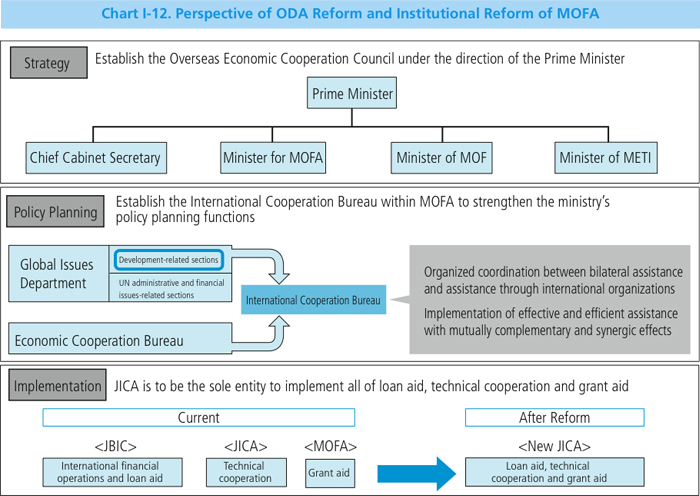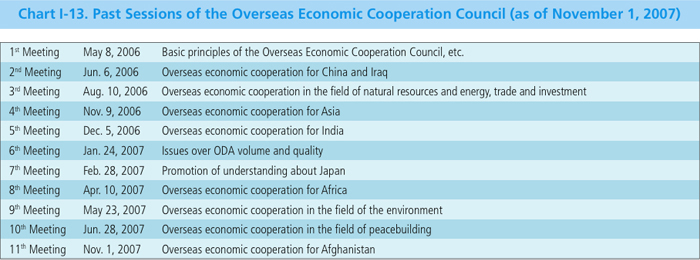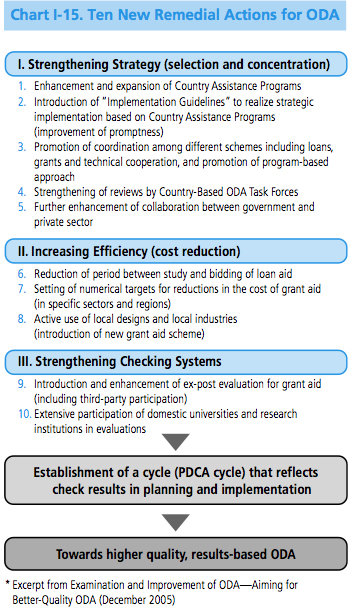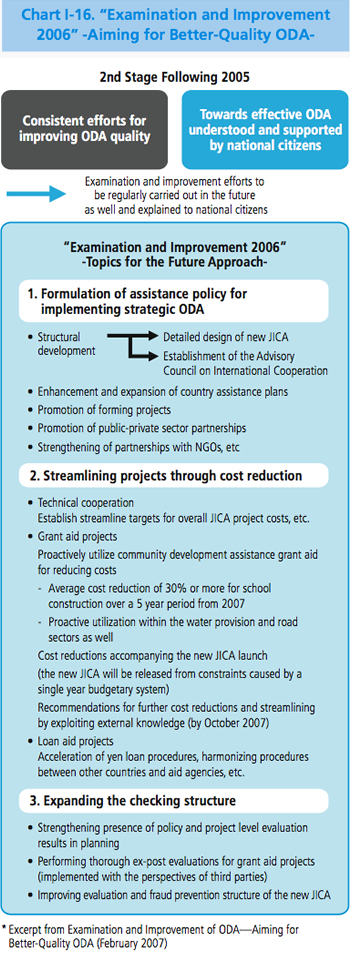Japan's Official Development Assistance White Paper 2007
Main Text > Part I JAPAN'S OFFICIAL DEVELOPMENT ASSISTANCE IN ITS TRANSITION PERIOD > Chapter 3 Advancing Official Development Assistance Reforms
Chapter 3 Advancing Official Development Assistance Reforms

Women spinning thread at an NGO that supports profession development for women in Nepal (Photo: Minako Nakayama)
Among the international environment for assistance, overviewed in the previous chapter,1 Japan is being called on to promote cooperation in fields in which it has traditionally been deeply involved, such as coping with the issue of climate change and support for Africa. This coincides with the fact that in 2008 the G8 Development Ministers' Meeting (April), TICAD IV (May), and the G8 Hokkaido Toyako Summit (July) will all be held in Japan. The sound execution of ODA reforms − from the planning and formulation to the implementation stages - is a pressing challenge if Japan is to exercise leadership in international cooperation under present budgetary constraints.2 With the establishment of the new JICA in October 2008 in mind, Japan is being called upon to manifest the results of reforms on the ground in developing countries. The establishment of the International Cooperation Bureau in MOFA in August 2006 is a milestone in this regard.
1. Strengthening Strategic Implementation of Assistance ("Selection and Concentration")
(1) Promoting International Cooperation Based on Foreign Policy
By means of cooperating to improve the economies and societies of developing countries, Japan's development assistance is useful in strengthening the foundation of Japan's diplomacy. It is important to strategically plan and formulate international cooperation and to adequately reflect this in project implementation based on the assistance requirements of developing countries, taking the foreign policy into consideration. In the final report of the Study Group on Overseas Economic Cooperation3 (February 2006), the group indicated that it was necessary to establish a "control tower," the purpose of which would be to strengthen the strategic aspects of overseas economic cooperation from a viewpoint encompassing the mobilization of ODA and other government funding, as well as private sector funding. Following this, in April 2006 the Overseas Economic Cooperation Council4 was established in the Cabinet with the Prime Minister as its chairperson. This body was tasked with expeditiously and substantially deliberating over important matters related to overseas economic cooperation.5 Moreover, in the same month the International Cooperation Planning Headquarters was established in MOFA, with the Minister for Foreign Affairs as its head. Based on the strategic orientation of overall foreign policy and the deliberations of the Overseas Economic Cooperation Council, the headquarters deliberates over matters such as assistance policies for each region as well as methods to address individual sectors and challenges. By doing so, it is meant to promote international cooperation while constantly confirming the positioning of these matters within the total picture of foreign policy.
In 2007, MOFA formulated the Priority Policy and Regional Priority Issues for International Cooperation in FY2007 based on the basic strategy for international cooperation decided upon by the Overseas Economic Cooperation Council and the International Cooperation Planning Headquarters. In line with its foreign policy, Japan appropriately distributes ODA resources and makes efforts to ensure that its basic strategy is consistent with the implementation of each particular case of assistance. Following the establishment of the International Cooperation Bureau, it has become easier to reflect integrated measures from policy planning and formulation through to project implementation in the provision of not only bilateral assistance, but also multilateral assistance as well.
Chart I-12. Perspective of ODA Reform and Institutional Reform of MOFA

Chart I-13. Past Sessions of the Overseas Economic Cooperation Council (as of November 1, 2007)

(2) Advisory Council on International Cooperation
It is important to reflect in policies relating to international cooperation the opinions of members of the public who have specialized expertise and experience in international cooperation. This is because doing so facilitates strategic and efficient international cooperation with the understanding of the Japanese people. It was for this reason that the Advisory Council on International Cooperation, was set up in March 2007 through the request of the Minister for Foreign Affairs, and headed by Toshio Watanabe, President of Takushoku University.6 This council carries out discussions on basic policies for international cooperation from a wide range of viewpoints. The three points of inquiry from the Minister for Foreign Affairs are: (1) the basic philosophy for international cooperation policies; (2) public participation in international cooperation (development of, and education for, the human resources to undertake international cooperation, etc.); and (3) challenges for the formation and implementation of ODA projects (increasing their efficiency and speed, public-private partnerships, collaboration with NGOs, etc.). A mid-term report is scheduled by the end of 2007.7
Chart I-14. Past Meetings of the Advisory Council on International Cooperation (as of November 13, 2007)

2. Effective Implementation of Assistance
Japan is undertaking a variety of measures in order for its development assistance to effectively contribute to economic and social improvement in developing countries. These include conducting drastic structural reorganizations within MOFA and the implementation agencies, collaborating on bilateral assistance and assistance through international organizations, as well as facilitating cooperation through different assistance mechanisms.
(1) Collaboration between Bilateral Assistance and Assistance through International Organizations
MOFA underwent a structural reorganization in August 2006. The Economic Cooperation Bureau and the Global Issues Department in charge of international development agencies were integrated to newly form the International Cooperation Bureau. Doing this set in place a system whereby the planning and formulation of bilateral assistance and assistance through international organizations is uniformly conducted. Japan strives to implement effective and efficient international cooperation by bettering the results of its cooperation in developing countries. This is done through collaborations which utilize the respective features of bilateral cooperation and multilateral cooperation. Positive results which are anticipated through such collaboration include the following:
1) Synergistic effects brought about by combining the specialized expertise of international organizations and Japan's technology and experience. For example, since 2004 in the primary education sector in Bangladesh, Japan has been implementing8 cooperation which combines the UNICEF's expertise in education with Japan's expertise in science and mathematics education, in which Japan has a comparative advantage.
2) Synergistic effects brought about by increasing the amount of aid (total funds) through collaboration with international organizations and broadening the range in the field in developing countries. For example, in October 2007, Japan decided the provision of ¥3.5 billion in loan aid to Uganda for the development of the domestic electricity transmission network in the south-east of the country through co-financing with the African Development Bank. In Sudan, five Japanese NGOs in the Japan Platform (JPF) have been conducting activities utilizing ODA funds since May 2006. These NGOs have been implementing a variety of activities to assist returned refugees including installing water purifiers, wells, and toilets; supplying water at schools; providing sanitation education; and running centers where returned refugees can stay. They are conducting project coordination with other organizations such as the UNHCR, the United Nations World Food Programme (WFP), UNICEF and others, expanding a wide range of assistance as a whole.9
3) Effects brought about by utilizing the flexible implementation structures of international organizations. This will enable the utilization of the ground offices of international organizations which are branching out to different regions of the world. In addition, it will also be possible to support to the residents of remote districts, ethnic minorities, and social groups who are isolated from society in developing countries and to utilize rapid initial-response systems in such cases as disaster relief. For example, Japan has showed its presence by providing such emergency humanitarian assistance as medical care and food assistance through international organizations at the immediate post-conflict stage, when it is difficult to provide bilateral assistance, in Iraq, Sudan, etc.
4) Effects brought about by utilizing the political neutrality of international organizations. For example, cooperation over the population issues and HIV/AIDS countermeasures may be sensitive in some countries, and therefore it is useful to work with organization with neutrality and expertise such as the United Nations Population Fund (UNFPA) and the International Planned Parenthood Federation (IPPF). Furthermore, international organizations make it possible for Japan to contribute to humanitarian assistance without worrying about issues like whether or not Japan has diplomatic relations with the recipient country.
By effectively combining bilateral assistance and assistance through international organizations, Japan can make its aid more effective, and furthermore, take an integrated stance from advocacy in the international fora through to implementation of assistance in the field.
(2) Facilitating Coordination among Different Aid Instruments
Pursuant to the Law about Promotion of Administrative Reform to Realize a Simple yet Efficient Government approved in May 2006, JBIC's yen loan operations will be succeeded to the new JICA which is to be established in October 2008. Following this, in November 2006 the Diet enacted the Act for Partial Amendments to the Act on the Incorporated Administrative Agency Japan International Cooperation Agency. Based on this, technical cooperation, loan aid, and grant aid will basically be implemented in an integrated manner under the new JICA. By means of this reform, the new JICA will become one of the world's premier assistance implementation agencies from the point of view of the scale of its funding. What is more, it intends to implement even more effective and efficient assistance by strengthening coordination among instruments of aid at the study and project formulation/implementation stages. In particular, it will become possible to utilize the grant aid more flexibly than in the past, by means of transferring it from the government to the independent administrative agency (JICA). As such, it will be possible to ensure an organic collaboration among these three instruments of aid, while also facilitating project formation and rapid approval and implementation over a more flexible timeframe.10 At the same time, developing human resources which are comprehensively well-versed in the three instruments of aid is also an important challenge.
Initiatives for the Reform of JICA and Preparations for the Establishment of the New JICA
Since its conversion to an independent administrative institution in 2003, JICA has adopted a "field based management" based on the JICA Reform Plan, and has been strengthening its system of overseas offices to enable accurate and swift responses to various agendas of developing countries. In Japan, JICA has been working toward "reform of domestic operations" and "reorganization of domestic offices" in particular, and also integration of overseas projects and domestic training programs as well as reviewing the functions and allocation of each regional block. It is also working toward strengthening its information transmitting capacity to the public. This series of reforms is aimed at restructuring the ODA implementation system so that it can adequately and promptly meet the needs of developing countries. JICA has set FY2006 as the "final adjustment toward completion." It is advancing a variety of efforts in its role as an executing agency, such as strengthening strategic aspects with a view to improving the quality of technical cooperation projects, facilitating project formation, and facilitating the materialization of training results.
Furthermore, JICA and JBIC have been collaborating through exchanges of information and views, and their relationship has been further strengthened by measures including the following: (1) holding consultations for formulation and preparation of projects through country-based ODA task forces;11 (2) strengthening collaboration at each stage of specific projects including implementation and operational maintenance following completion; and (3) promoting personnel exchanges. MOFA, JICA, and JBIC are currently advancing in earnest with preliminary operations for the establishment of the new JICA scheduled for October 2008.
Since its conversion to an independent administrative institution in 2003, JICA has adopted a "field based management" based on the JICA Reform Plan, and has been strengthening its system of overseas offices to enable accurate and swift responses to various agendas of developing countries. In Japan, JICA has been working toward "reform of domestic operations" and "reorganization of domestic offices" in particular, and also integration of overseas projects and domestic training programs as well as reviewing the functions and allocation of each regional block. It is also working toward strengthening its information transmitting capacity to the public. This series of reforms is aimed at restructuring the ODA implementation system so that it can adequately and promptly meet the needs of developing countries. JICA has set FY2006 as the "final adjustment toward completion." It is advancing a variety of efforts in its role as an executing agency, such as strengthening strategic aspects with a view to improving the quality of technical cooperation projects, facilitating project formation, and facilitating the materialization of training results.
Furthermore, JICA and JBIC have been collaborating through exchanges of information and views, and their relationship has been further strengthened by measures including the following: (1) holding consultations for formulation and preparation of projects through country-based ODA task forces;11 (2) strengthening collaboration at each stage of specific projects including implementation and operational maintenance following completion; and (3) promoting personnel exchanges. MOFA, JICA, and JBIC are currently advancing in earnest with preliminary operations for the establishment of the new JICA scheduled for October 2008.
Box 5. Examples of Collaboration in Bilateral Assistance and Assistance through International Organizations
(3) Expediting Loan Aid
Expediting loan aid operations is beneficial from the viewpoint of facilitating the achievement of results from development projects in developing countries, as well as further raising the strategic usefulness of Japan's aid. For this reason, the Japanese Government announced the measures to expedite Japanese ODA loans in June 2007. This clearly establishes that specific measures to expedite the respective stages of project formulation, the request and provision of loans, and project implementation will be introduced sequentially with the cooperation of the governments of partner countries. Japan is making ongoing efforts in order to soundly execute these measures and to expedite loan aid.
STEP: Special Terms for Economic Partnership
STEP is a system that was introduced in 2002 in order to utilize Japan's exceptional technology and know-how in promoting technology transfers to developing countries. The terms of STEP restrict prime constructers to Japanese companies and serve to further promote the visibility of Japanese aid through project implementation and the use of technology by Japanese companies on the ground in developing countries.
STEP is a system that was introduced in 2002 in order to utilize Japan's exceptional technology and know-how in promoting technology transfers to developing countries. The terms of STEP restrict prime constructers to Japanese companies and serve to further promote the visibility of Japanese aid through project implementation and the use of technology by Japanese companies on the ground in developing countries.
3. Strengthening Collaborations with the Public
International cooperation is implemented with the participation of a broad range of civil society partners. In order to enhance development results, it is important to strengthen collaborations, particularly with private sector companies and NGOs.
(1) Promoting Public-Private Partnerships
Promoting strategic public-private partnerships which incorporate the joint objectives of project deployment by private sector companies (direct investment) and implementing ODA enhances the presence of Japan's international cooperation. On this account, MOFA provides forums for the exchange of opinions between economic organizations and individual private sector companies, in order to deepen dialogue. With a view toward TICAD IV, in October 2007 Japan dispatched a public-private joint study team to Africa which studied the feasibility of public-private partnerships on the continent. What is more, public-private partnerships are also important from the perspective of ensuring natural resources and energy.
See Chapter 1, Section 2
(2) Cooperation with NGOs
NGOs conduct activities in developing countries and regions, being capable of providing fine-turned assistance that meets the diverse needs of developing countries and regions, and of promptly and flexibly implementing emergency humanitarian assistance activities in the case of large-scale national disasters without waiting for a request from the government of the afflicted country. These activities are also important in that they give Japan a visible presence. In recent years, NGOs have been carrying out various activities not only in the fields of development assistance and emergency humanitarian relief, but also in the fields of environment, human rights, trade, disarmament and non-proliferation. Their role in the international community is thus expected to become increasingly significant.
In order to bolster the activities of Japanese NGOs, the Government provides financial support for NGO activities overseas, and promotes capacity building projects, dialogue and cooperation with NGOs and a variety of cooperative efforts designed to strengthen the basis of Japanese NGOs.
Grant Assistance for Japanese NGO Projects is a system through which project funding is provided to Japanese NGOs that carry out economic or social development activities in developing countries or regions. The budget for the system was ¥2 billion at the time of its establishment in FY2002, which increased to ¥2.8 billion in FY2007.
The government assists Japanese NGOs in their efforts to build their own capabilities. In recent years, Japanese NGOs have enjoyed a high level of appreciation for their remarkable activities on the ground. However, for many Japanese NGOs, efforts are required to enhance their range and organizational and managerial capacity in order to function better in providing assistance. With this in mind, MOFA is implementing a variety of programs. A training program was initiated in FY2007 which dispatches staff members from Japanese NGOs to overseas NGOs.
The government is promoting dialogue and cooperation with NGOs. MOFA has been organizing the NGO-MOFA Regular Meetings since 1997, which have proactively discussed ODA policy and the Grant Assistance for Japanese NGO Projects. ODA implementing agencies, JICA and the Japan Bank for International Cooperation (JBIC), hold regular meetings and receive views from NGOs on ODA projects. In developing countries, where many Japanese NGOs are active, regular meetings have been held since 2002, whereby embassy officials, JICA, JBIC and NGO personnel engage in consultations on how to make Japanese assistance more effective and efficient. This is happening in a total of 13 countries to date, including Cambodia and Bangladesh.
In addition to these consultations between NGOs and the Japanese government both in Japan and overseas, the Japan Platform (JPF) was founded in 2000 through close coordination among NGOs, government and business circles. Twenty-five participating NGOs in the JPF swiftly launch and implement emergency humanitarian assistance activities utilizing ODA and private funding that had been provided in advance. The JPF rapidly deployed the emergency humanitarian assistance activities to Indonesia (for the Java Island earthquake), Iraq, Sudan, Liberia, Timor-Leste and Lebanon in FY2006. The ODA fund spent in these operations amounted to approximately ¥1 billion.
The government is taking measures to extend and diversify cooperation with NGOs through more frequent and closer dialogue in order for NGOs to conduct social and economic development activities more proactively on the ground in developing countries.
4. For the Continuation of Efforts to Improve Quality
It is important that Japan conduct periodic examinations of the quality of ODA, clearly define specific measures to overcome deficiencies, and soundly put these into practice in order to implement effective and efficient assistance. Together with these, it is also essential that the Government clearly articulates to the public the efforts undertaken. The purpose of this is to continue with ODA reforms, while ensuring public support. For this reason, in December 2005 MOFA created and released a report titled the Examination and Improvement of ODA-Aiming for Better-Quality ODA (hereinafter referred to as "Examination and Improvement of ODA"). Ten new improvement measures for ODA are listed under the three pillars of "strengthening strategic value (selection and concentration)," "increasing efficiency (cost reductions)," and "improving checking systems." It posited that it would aim for ODA focused on better quality results by means of establishing the PDCA (Plan→Do→Check→Act) cycle in ODA. The PDCA cycle would reflect the results of future checks into planning and implementation. In February 2007 the Examination and Improvement of ODA 2006 was released This pulled together the ensuing implementation status of the various measures incorporated into the Examination and Improvement of ODA from 2005, and also stipulated measures to further promote reforms. In addition to the reform efforts to date, Japan intends to implement aid more strategically, effectively, and efficiently through the initiatives set forth in the Examination and Improvement of ODA report.
Chart I-15. Ten New Remedial Actions for ODA

Chart I-16. "Examination and Improvement 2006" -Aiming for Better-Quality ODA-

Feature — Towards a Vibrant Africa —
Column 3 Remaking Every Elementary School into a "School for All"
— Applying Japan's Assistance Models to 9,000 Schools in Niger —


 Next Page
Next Page